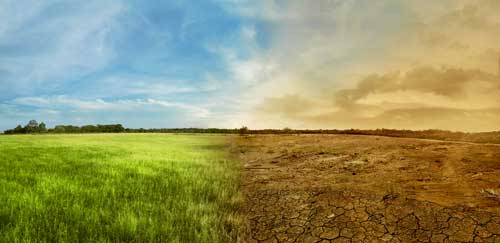When we think about climate change, rising seas, warmer temperatures, and fiercer storms come to mind.
But global warming is also affecting our food.
A new study shows that it is becoming less nutritious. It lacks a crucial mineral that we all need for good health.1
Climate change is due to rising levels of carbon dioxide (CO2) in the atmosphere. It’s known that higher levels of CO2 deplete plants of certain nutrients.
One of them is zinc. People get 68% of this vital mineral from plant-based foods.
But a study from the Harvard T.H. Chan School of Public Health shows that because crops have less zinc, 175 million people could become deficient in the mineral by 2050. And those who are already deficient would likely become more so.
The Importance of Zinc
Zinc is critical to the human body for:2
- Activating T cells, which control and regulate the immune response. T cells also attack cancer cells.
- Preventing damage to the retinas.
- Reducing risk of inflammatory diseases.
- Maintaining healthy skin.
- Keeping colds at bay.
Wait, It Gets Worse
As if zinc depletion wasn’t bad enough, higher CO2 also results in lower plant levels of protein and iron. Humans get 63% of their protein and 81% of their iron from vegetable sources.
By mid-century, the study shows, this could cause 122 million people to become protein deficient.
Protein is an essential component of every part of your body. You need it to build and repair tissues.3 Lack of iron leads to anemia and fatigue.4
5 Foods High in Zinc
Don’t fall prey to a lack of zinc. A number of common foods offer significant amounts of the mineral.
The FDA recommends that adults get a daily value (DV) of 15 mg of zinc. According to the National Institutes of Health, you can get:5
- About 7 mg of zinc in 3 ounces of beef chuck roast (47% of DV).
- 6 mg in an ounce of cashews (11% of DV).
- 9 mg in 3 ounces of pork chops (19% of DV).
- 4 mg in 3 ounces of lobster (23% of DV).
- 74 mg in 3 ounces of oysters (493% of DV).
Foods high in protein include red meat, poultry, seafood, dairy products, eggs, and beans. Foods rich in iron include beef, oysters, poultry, tuna, lentils, spinach, and beans.
Climate change is a serious problem. But at least in regard to nutrition, you can watch your diet and mitigate the negative effects.
Editor’s Note: Zinc is just one way to ward off infectious illnesses. Find out more about boosting your immune system in our report, Bulletproof Your Immunity: Easy Ways to Protect Your Health. Get all the details HERE.
Related Articles
Five Vital Reasons to Get More Zinc as You Age
Best Way to Use Protein to Stay Strong
5 Strange Signs You Need an Iron Boost Now
Like this Article? Forward this article here or Share on Facebook.
References:
1 https://www.sciencedaily.com/releases/2018/08/180827180806.htm
2 https://www.medicalnewstoday.com/articles/263176.php
3 https://www.webmd.com/men/features/benefits-protein#1
4 https://www.webmd.com/vitamins-and-supplements/features/iron-supplements#1
5 https://ods.od.nih.gov/factsheets/Zinc-HealthProfessional/

